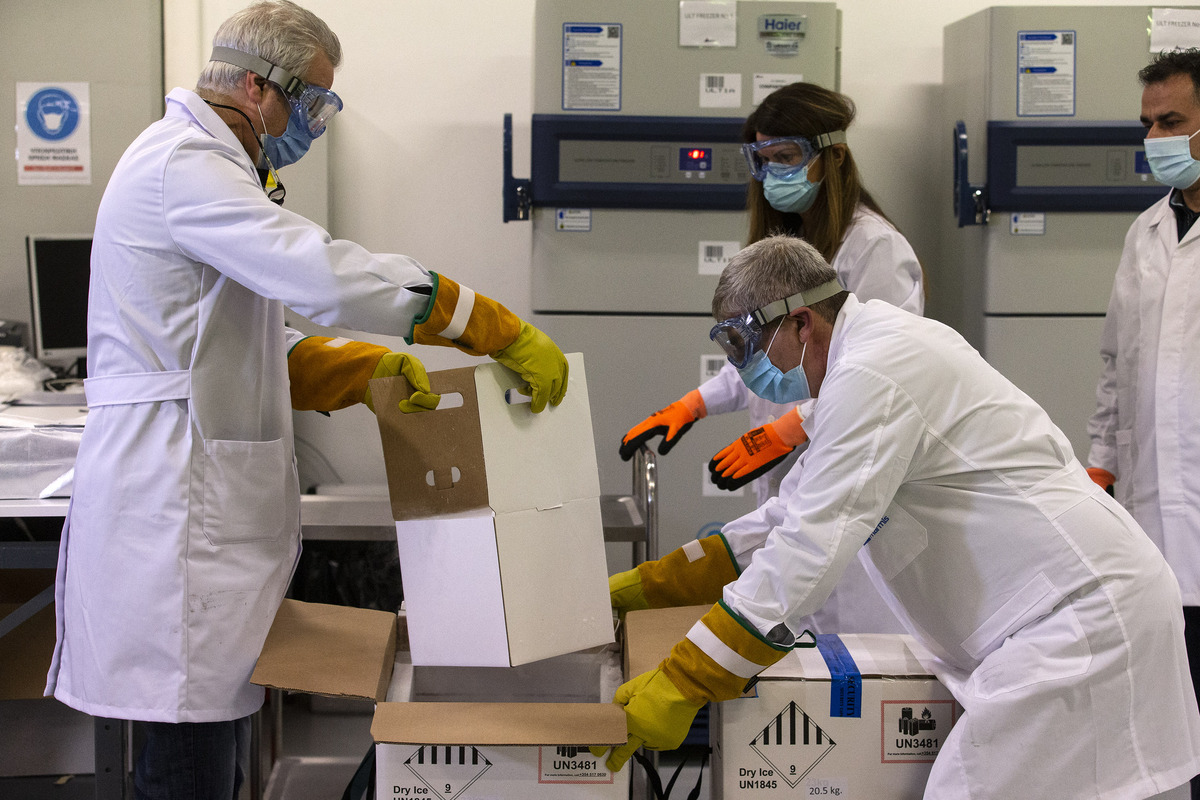Vaccine push takes on a global dimension


More nations ready shots amid fears over virus variant
PARIS-Several European Union countries were set to begin vaccinating their most vulnerable groups on Sunday as the number of confirmed COVID-19 cases worldwide continued to rise and a new coronavirus variant spread internationally.
The first doses of the Pfizer-BioNTech jab arrived in hard-hit Italy, Spain and France on Saturday, ready for distribution to retirement homes and care staff.
The approval and distribution of vaccines has boosted hopes that next year there could be a respite from the pandemic, which has killed more than 1.75 million people. Global COVID-19 cases surpassed 80 million on Saturday, Johns Hopkins University said.
A 101-year-old woman in a care home became the first person in Germany to be inoculated on Saturday, in what the country's health minister called a "day of hope".
The first injections were also given in Hungary and Slovakia.
The three countries joined, among others, Britain, Canada, the United States, Switzerland, Serbia, Singapore and Saudi Arabia, which have also begun their vaccination campaigns.
Vaccinations were set to begin at five Athens hospitals on Sunday, with health personnel and elderly residents of nursing homes.
Greece's president, prime minister, and 42 government, military and police officials deemed essential to the functioning of the state will also be vaccinated in the first days.
Reflecting the mood in Europe, Italian Foreign Minister Luigi Di Maio said: "We'll get our freedom back, we'll be able to embrace again."
He urged his compatriots to get the shot.
However, polls show only 57 percent of Italians intend to have the injection, whereas scientists estimate herd immunity can only be reached if 75 to 80 percent have it.
Flare-ups of the virus continue to force tougher restrictions, with Israel going into a two-week general lockdown from Sunday and France's health minister saying his government would take similar steps in the event of a post-Christmas rise in cases.
Jitters also remained over a new strain that has emerged in Britain and reached several other countries.
Canada reported on Saturday that it had detected two variant cases in the province of Ontario in a couple who had not traveled recently nor had high-risk contacts with other people. This came as the province went into a lockdown the same day.
Also, a person who traveled from London to Sweden to celebrate Christmas has been confirmed sick with the new and more infectious variant of the coronavirus that has been rapidly spreading in the UK recently.
The new strain, which experts fear is more contagious, prompted more than 50 countries to impose travel restrictions on the UK.
Across the world, people were still being urged to respect social distancing guidelines, even as millions celebrated Christmas.
Switzerland's health minister Alain Berset said on Saturday that his country had put the emphasis on personal responsibility.
However, he admitted that this approach had not worked and that the government blundered in easing restrictions too far, resulting in some of Europe's fiercest infection rates during the pandemic's second wave.
In Australia, Sydney's COVID-19 outbreak continued on Sunday with more than a quarter of a million people in lockdown as the city awaited word on whether any public New Year's Eve celebrations will be allowed.
Seven cases of the new coronavirus were reported in the state of New South Wales linked directly to the outbreak in Sydney's northern beaches suburbs, which are under a stay-at-home order until Wednesday.
Apart from current vaccination plans, the United Kingdom will distribute Oxford University's COVID-19 vaccine from Jan 4, according to plans being drawn up by ministers, The Sunday Telegraph reported.
The government hopes to give the first dose of either the Oxford vaccine, which has been licensed to the pharmaceuticals company Astra-Zeneca, or the Pfizer vaccine to 2 million people over the next two weeks, the newspaper said.
The Oxford vaccine is expected to be approved by medical regulators in days, the newspaper said.
Argentina will begin vaccinating its citizens against the coronavirus on Tuesday using the recently delivered Russian Sputnik V vaccine, the government said on Saturday, following its approval by health authorities for emergency use.
On Wednesday Argentina became the third country to approve the Sputnik V vaccine, after Russia and Belarus. Argentina has also approved the Pfizer and BioNTech COVID-19 vaccine.
Agencies - Xinhua

































